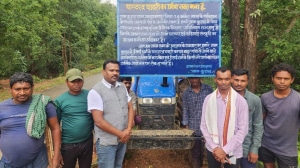Cola Communism
IT’S economic determinism by another name. Seen as a business conglomerate rather than a political party, the CPI(M)’s Kerala unit...

 IT’S economic determinism by another name. Seen as a business conglomerate rather than a political party, the CPI(M)’s Kerala unit boasts a Rs 4,000 crore asset base. But the decidedly bourgeois investment decisions are becoming hard to explain. Having progressively painted themselves into a corner by opposing foreign investment — the recent hostility to the proposed IT City in Kochi being one example — and alienated the state’s job-hungry middle class, the party finds itself confronting a materialist dialectic.
IT’S economic determinism by another name. Seen as a business conglomerate rather than a political party, the CPI(M)’s Kerala unit boasts a Rs 4,000 crore asset base. But the decidedly bourgeois investment decisions are becoming hard to explain. Having progressively painted themselves into a corner by opposing foreign investment — the recent hostility to the proposed IT City in Kochi being one example — and alienated the state’s job-hungry middle class, the party finds itself confronting a materialist dialectic.
One case is particularly embarrassing. Some 17,000 workers at Kannur’s CPI(M)-controlled Dinesh Beedi Cooperative have been agitating against hefty wage and work cuts. They see ‘‘management’’ as too busy and insensitive.
‘‘Management’’, of course, is the party, a diversified business group in Kerala. It runs or plans to run a television channel, amusement/theme park, air-conditioned auditoria, plush hospitals and hypermarkets. IT hubs and high-end professional colleges are also under consideration.
Dinesh Beedi was once a unique model, hailed all over the socialist world. In 1969, unemployed beedi workers in Kannur put in Re 1 each to form the Kerala Dinesh Beedi Cooperative. The then communist government of E.M.S. Namboodiripad chipped in Rs 13.5 lakh as share capital, plus a Rs 7 lakh working capital loan. The ‘‘owners’’ remained the workers, completely in the grip of the party.
Some workers have another assessment. ‘‘Dinesh Beedi did well for years,’’ says one of them, ‘‘because the party actively helped it, to the point of ensuring a market among other worker segments. The party still has millions of workers in Kerala. It could easily promote our diversified products … But it is no longer keen.’’
Jolted by the Dinesh Beedi unrest, the CPI(M) had to depute senior state-level functionaries for a door-to-door campaign in Kannur’s Azhikode and Koothuparamba assembly constituencies, which saw byelections on June 2. They were asked to convince voters Dinesh Beedi was a victim of business circumstances, flawed Central policies, globalisation.
| The communists protested that Coca-Cola’s Plachimada plant was exploiting drinking water in the region. Now they may use the beverage company’s legal defence to save the party’s own water -guzzling amusement park being built in Kannur |
IT’S not just the red beedi workers who are in trouble in Kerala’s communist heartland. About 28,000 handloom workers — over three-fourths of them in CPI(M)-controlled cooperative societies — are in no better shape. Many are migrating to manual labour, after a 50 per cent fall in production, following the Centre removing protective quotas for handloom exports a few months ago.
‘‘Labour costs can’t be kept down by too much here,’’ bemoans the secretary of a CPI(M)-run cooperative, ‘‘too many exporters now source cheaper powerloom textiles from Tamil Nadu. Many misuse the famous Kannur label.’’ The same applies to dozens of party-controlled coir cooperatives.
‘‘Let’s face it, we need to keep up with realities. We can’t simply abandon old initiatives, but sticking to them won’t help either,’’ says a senior CPI(M) leader. He insists the party will find an ‘‘acceptable solution’’ to its business problems when it comes to power, as is expected, after the 2005 assembly election.
THIS attitude is particularly important because the Kerala CPI(M) is putting together a policy document that, it hopes, will help deflect some of the unenviable comparisons it has been drawing with comrade Buddhadev Bhattacharya’s reformist surge in West Bengal. More important, it may appeal to Kerala’s disenchanted middle class.
Despite his rout of the V.S. Achtanandan-led hardliners at the party’s most recent state conference in Malappuram, state secretary Pinarayi Vijayan may still not be able to do a Buddhadev in Kerala. But ‘‘Vision 2025’’, as the proposed document is called, is expected to usher in drastic change on issues such as foreign investment, private participation in development and the role of the market in Kerala.
If Vijayan pulls that through, it could mean goodbye to the violent protests with which the comrades have greeted Asian Development Bank, World Bank and other such agency delegations on their visits to Kerala.
In 2004, the ADB team had to run away, literally, after the DYFI — the CPI(M)’s youth wing — gave them a particularly nasty reception. It’s a different matter that the comrades later backtracked. CPI(M) mayors in Kerala actually sought ADB aid.
Now CPI(M) sources say their final ‘‘Vision Document’’ may mimic West Bengal to the point of allowing closure of unviable PSUs — and drawing private investment to revive those in deep trouble. All this, of course, depends on ‘‘how much room the hardliners allow’’. Apparently two thrust areas in this document will be infotech and biotech.
THERE is some irony here. The party’s doctrinaire brigade — led by Achuthana-ndan — has promised a Left Front government will ‘‘review’’ the Smart City IT project. Acuthanandan claims the terms for the Smart City are a complete sellout to the Dubai-based promoter firm.
Bourgeoisie phobia can be a selective thing. The same Achutanandan, now 82, supported the Namboodiripad government — the first elected communist regime in the world — when it courted the Birla-owned Grasim Industries in 1957. Grasim eventually set up one of India’s largest pulp factories in Mavoor.
Among the sops the communist government gave the Birlas was land at Re 1 per acre, heavily subsidised power, millions of litres of free water and tens of thousands of tonnes of softwood from Kerala’s forests (at prices that were a fraction of what tribals who depended on the forest had to pay).
The Grasim unit finally closed down in 1999. It wasn’t cost-effective despite the freebies, and there was local disquiet after alleged pollution-related cancer cases and deaths.
| Directors on the board of the CPI(M)’s Kairali TV include an NRI businessman from Dubai, and a hooch baron arrested for selling illicit liquor |
Comrade NRI, meet party-going tycoons
MEANWHILE, notwithstanding ‘‘simple living and high thinking’’slogans, the CPI(M) runs Kerala’s richest political entity. Vijayan refuses to talk of the assets worth Rs 4,000 crore. He insists all party wealth belongs to the ‘‘working class’’.
‘‘Working class’’ is, however, an unusually expansive term. Among the CPI(M)’s business partners are NRI tycoons, big businessmen, even a hooch king. When Kairali TV, now one of Kerala’s leading channels, was set up by the party a half-decade ago, P.V. Abdul Wahab of the Dubai-based Peevees Group put in money and became a director.
Interestingly, Wahab — whose business extends from trading to real estate, Bahrain to Saudi Arabia — became a Rajya Sabha member in 2004 courtesy the Muslim League. A faction of the DYFI filed a complaint, saying he was an NRI and so ineligible to stand for election in India. The CPI(M) establishment was livid at ‘‘dissidence’’ against a director of the party’s television network.
Three years ago, following some deaths in a hooch tragedy in Kerala, one Manichan was arrested. As it happened, he too was a director of Kairali TV. In seeking investment, Vijayan and his merry men have been quite pluralistic.
Much of the comrades’ recent investment has been channelled through private front companies, which usually list as directors party functionaries who also happen to be running CPI(M)-sponsored cooperatives. The cooperative societies then fork out hefty contributions to the company as investment.
The resource base is huge. In Kannur alone, the CPI(M) boasts 200 cooperatives. The only hitch is, if the business collapses, the worst hit will be the working class. These cooperatives, after all, draw from a pool collected from worker-members.
Now the party is planning a network of professional colleges, still undecided whether it should begin with one devoted to engineering or medicine. Also in the works is a Rs 10 crore hypermart in Tellicherry.
Capitalist contradictions
IT may be pointed out the CPI(M) had decided some time ago to eschew bourgeois investment. It had denied plans to touch the stock market. In April, E. Narayanan, chairman of the party’s showpiece rubber cooperative RUBCO — turnover: Rs 450 crore — announced this was the state secretariat’s decision.
However, Narayan, who heads the party’s in-house business development cell, was clear this would not affect existing shareholders in CPI(M) businesses. There already seems to have been a rethink. Speaking to The Sunday Express, CPI(M) central committee member M.A. Baby said local promoters of party-sponsored projects would continue to decide how to raise funds.
The big project for the moment is the amusement park in Kannur’s Parassinikadavu. ‘‘It is too early to say when we will begin getting back our investment,’’ grins the secretary of a cooperative society that has contributed to the park’s Rs 25 crore phase I budget, ‘‘we hope it will.’’
Before that the party has to iron out some contradictions. The CPI(M) has been leading the protests against the Coca-Cola plant in Plachimada, Paalakkad, on the grounds that the soft drink company is exploiting the area’s drinking water. But now it faces the same charge in Parassinikadavu, where its water theme park is predicted to guzzle millions of litres of water.
‘‘The party will probably use the same High Court judgement that allowed Coca-Cola to continue in Plachimada as a precedent to run its own water park,’’ points out an activist of the Kannur District Environment Committee.
Coca-Cola and communism, two entities united by the colour red. In Kerala, God’s own country, it would be a nice fit.



- 01
- 02
- 03
- 04
- 05




























